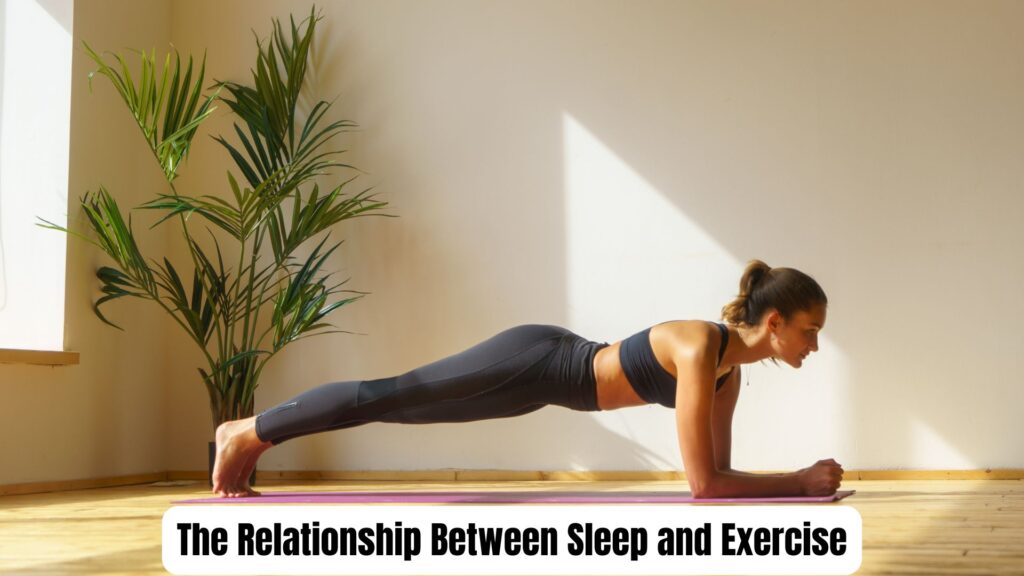Overview
Sleep and exercise are two important aspects of a healthy lifestyle, and the two are closely related. When you want to improve your fitness, it’s essential to understand how the relationship between sleep and exercise works.
In this article, we will answer the question in depth: “What is the mutual influence of sleep and exercise?” In addition, we will learn how sleep affects exercise performance, whether exercising requires more sleep, and what effect sleep quality has on fitness levels.
Introduction to Sleep and Exercise
Why is sleep important?
Sleep is the body’s natural way to rebuild and rest the brain. During sleep the body repairs itself, maintains hormonal balance, and muscle recovery occurs.
The importance of exercise
Regular exercise not only improves physical health but also improves mental health. It helps reduce stress, increase metabolism, and strengthen muscles.
The Relationship Between Sleep and Exercise

Image credits: canva.com
1. Effect of sleep on exercise performance
Good quality sleep improves exercise performance. When you get enough sleep:
- Muscle strength improves.
- Stamina increases.
- The recovery time is less.
On the other hand, lack of sleep increases fatigue and decreases mental alertness, which affects your exercise capacity.
2. Does exercise make you need more sleep?
Yes, regular and intense exercise may require extra sleep for rest and recovery. Exercise causes tension in the muscles, which requires deep and restful sleep to heal.
The Relationship Between Sleep and Fitness Level
1. The effect of sleep quality and fitness
Sleep quality and fitness are closely related. Reasons for better sleep:
- Body fat reduces.
- The metabolic rate remains balanced.
- Muscle development is accelerated.
People who suffer from sleep deprivation produce more of the stress hormone (cortisol), which can lead to weight gain and a decline in fitness.
2. Effect of fitness on sleep
Research shows that regular exercise improves sleep quality. Activities such as aerobics and yoga, in particular, provide relief from insomnia and improve the sleep cycle.
The Pros and Cons of Exercise and Sleep
Advantages
- Increased energy levels: Better sleep helps you get maximum benefits from exercise.
- Improves sleep patterns: Exercise helps make sleep deeper and more restful.
- Improves heart health: Regular exercise and good sleep reduce the risk of heart disease.
Disadvantages
- Excessive exercise can interfere with sleep.
- Exercising at the wrong time (such as right before bedtime) can cause sleep disorders.
Sleep and Exercise: A Comparative Study
| aspect | The role of sleep | The role of exercise |
|---|---|---|
| Physical Recovery | Recovers muscles | Strengthens the muscles |
| Mental Health | Reduces stress | Increases endorphins |
| energy | Recharges energy | Uses energy |
| Sleep Cycle | Regulates sleep patterns | Improves sleep quality |
Future Prospects

Image credits: canva.com
Research on the relationship between sleep and exercise is ongoing. More to come:
- Performance monitoring devices could be developed that could measure sleep and exercise patterns.
- Sleep-based workout programs can be created.
- Apps and technologies that offer personalized suggestions can be more accurate.
Conclusion
The relationship between sleep and exercise is the foundation of a healthy lifestyle. Good sleep enhances exercise performance, and regular exercise improves sleep quality. By creating a balance between the two, you can not only achieve your fitness goals but also maintain physical and mental health.
FAQs
1. What is the relationship between sleep and exercise?
Sleep and exercise are closely related. Good exercise helps the body rest and recover, which leads to good sleep. Conversely, getting enough sleep increases the body’s energy and performance capacity, which can make exercise more effective. Both support each other.
2. Does exercise improve sleep?
Yes, regular exercise can improve sleep. Exercise tires out the body and the brain needs rest, which improves sleep. However, exercise mustn’t be too vigorous, especially at night, as it can affect sleep.
3. Can exercising at night cause sleep problems?
Excessive exercise at night can disrupt sleep. Such exercise can agitate the body, which can delay sleep. It is better to do light and low-stress exercises at night so that there is no negative effect on sleep.
4. How much sleep should one take after exercise?
After exercising, the body needs at least 7 to 9 hours of sleep to recover properly. This time helps the body in muscle repair, energy recovery, and mental recycling.
5. Can lack of sleep affect exercise?
Yes, lack of sleep can reduce exercise capacity. Sleep deprivation hurts muscle recovery and energy levels, which can lead to a drop in performance and fatigue. Therefore, getting enough sleep is important to maximize the benefits of exercise.